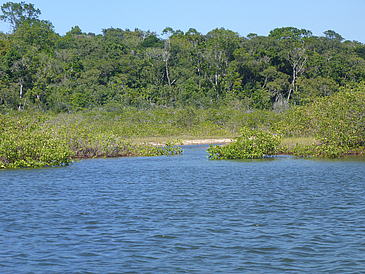Due to human activity, every growing quantities of the climate gas carbon dioxide are emitted into the atmosphere. The atmosphere then heats up and as a result, the Earth’s climate changes. The world’s oceans play an important role in storing CO2 from the atmosphere and thus in decreasing the effects of the climate crisis. However, researchers assume that the proportion of CO2 stores in the oceans will decrease. It is already the case that more CO2 is currently being produced than can be naturally stored.
The German Marine Research Alliance has therefore made it their aim to develop new processes and methods as part of the “Marine carbon sinks in decarbonization pathways” mission. It is to be investigated - in an interdisciplinary manner and together with companies - how and to which extent the oceans play a sustainable role in the extraction and storage of CO2 from the atmosphere and thus contribute to keeping climate change within the limits set in the Paris Agreement. This explicitly focuses on developing action options that are of value for the German climate strategy.
In six consortia, various methods of marine carbon dioxide extraction and storage will be assessed in terms of their potential, risks, and possible side effects, under consideration of the effects on the marine environment, the Earth system, and society, and subsequently be combined within an interdisciplinary assessment framework.
The AIMS3 research network will investigate to what extent CO2 can be permanently stored as a carbonate in the basaltic upper oceanic crust. The study comprises several expeditions that will be accompanied by subsequent laboratory experiments. It is planned that an edge of the Mid-Atlantic Ridge be drilled open and that the effects of a CO2 influx in crust rocks be monitored using innovative monitoring systems. AIMS3 will be coordinated by MARUM – Center for Marine Environmental Sciences at the University of Bremen.
The network project sea4soCiety pays attention to the carbon dioxide storage in vegetation-rich coastal ecosystems. Under consideration of further societal uses, as well as potential risks, and by means of expeditions, remote sensing data, stakeholder surveys, and scenarios, innovative approaches will be developed to improve the natural potential of carbon dioxide storage by means of ecosystem design. This project will be coordinated by the Leibniz Centre for Tropical Marine Research (ZMT).
In the first research mission phase, which is beginning now, the networks will form in order to effectively start their respective work at sea and between the partners. The first mission meeting, which has the aim of better connecting the research of the networks and carrying out knowledge transfer to user groups and decision makers, is planned for the beginning of 2022.
The following researchers from the University of Bremen are involved in the projects:
AIMS³:
- Prof. Dr. Achim Kopf (coordinator, MARUM)
- Prof. Dr. Wolfgang Bach (Faculty 05: Geosciences, MARUM)
- Prof. Dr. Ralf Bachmayer (MARUM, Faculty 03: Mathematics / Computer Science)
- Prof. Dr. Martin Eickhoff (Faculty 01: Physics / Electrical Engineering)
- Prof. Dr. Jutta Günther (Faculty 07: Business Studies & Economics)
- Dr. Tim Freudenthal (MARUM)
- Dr. Tobias Wendler (Faculty 07: Business Studies & Economics)
- Dr. Matthias Zabel (MARUM)
The GEOMAR Helmholtz Centre for Ocean Research Kiel, Fraunhofer IPM Freiburg, and Sea & Sun Technology are also involved.
sea4soCiety:
- Prof. Dr. Martin Zimmer, (coordinator, Leibniz Centre for Tropical Marine Research (ZMT), Faculty 02: Biology / Chemistry)
- Prof. Dr. Kai Bischof (Faculty 02: Biology / Chemistry, MARUM)
- Prof. Dr. Jan-Hendrik Hehemann (MARUM, Faculty 02: Biology / Chemistry)
sea4soCiety is being coordinated by Prof. Dr. Martin Zimmer (Leibniz Centre for Tropical Marine Research, Bremen). The following institutes are also contributing to the network project: Max Planck Institute for Marine Microbiology Bremen, Alfred Wegener Institute, Helmholtz Centre for Polar and Marine Research in Sylt and Bremerhaven, GEOMAR Helmholtz Centre for Ocean Research Kiel, Universität Hamburg, Leibniz University Hanover, University of Kiel, and University of Oldenburg.
In the research mission “Marine carbon sinks in decarbonization pathways” – in short: CDRmare – of the German Marine Research Alliance (DAM), around 200 scientists in six collaborative research consortia are investigating how and to what extent the ocean can play a sustainable role in the removal and storage of carbon dioxide from the atmosphere.
The long-term goal is to develop a roadmap for the active use of marine carbon sinks in order to contribute to the mitigation of the impacts of anthropogenic climate change and to help achieve the Paris climate goals. CDRmare (CDR = Carbon Dioxide Removal) is coordinated at the GEOMAR Helmholtz Centre for Ocean Research Kiel and the Leibniz Institute for Baltic Sea Research Warnemünde. Germany's Federal Ministry of Education and Research is funding the research mission with 27 million euros over an initial phase of three years (1.8.2021 - 31.7.2024). Further information: www.cdrmare.de/en
The German Marine Research Alliance and its 22 member institutions develop solutions-oriented knowledge and potential courses of action for the sustainable use of coasts, seas, and oceans.
More Information:
CDRmare research mission homepage: www.cdrmare.de/en
Press release from DAM on the start of the primary research mission: https://www.allianz-meeresforschung.de/en/news/mitigating-climate-change-more-effectively-with-oceans/
Contact:
Prof. Dr. Achim Kopf
AIMS3 Coordinator
MARUM – Center for Marine Environmental Sciences University of Bremen
Phone: +49 421 218-65800
Email: akopfprotect me ?!marumprotect me ?!.de
Prof. Dr. Martin Zimmer
sea4soCiety Coordinator
Leibniz Centre for Tropical Marine Research Bremen
Phone: +49 421 23800 161
Email: martin.zimmerprotect me ?!leibniz-zmtprotect me ?!.de

